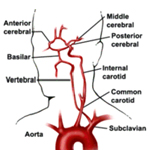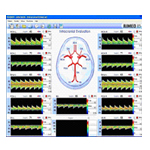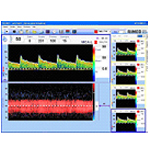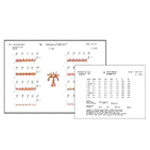Transcranial Doppler Testing

Desonics / Medical Multi Imaging provides Transcranial Doppler Ultrasound testing in the convenience of your Healthcare office, with a schedule that is convenient for you and your staff and most of all your patients. Our registered vascular technologists and board certified Neuroradiologists guarantee to bring the highest quality of care and professionalism to your patients and your practice. Our goal is to ensure the safety, comfort and care of your patients, before, during and after their procedure.
We use state of the art digital Transcranial Doppler Imaging technology and we always strive to provide you with prompt and accurate reporting of results so you as the Healthcare Professional can provide your patients with an accurate diagnosis and then determine the next step in their treatment plan. Our clinical team at Desonics / Medical Multi Imaging is determined and committed to stay abreast with the latest advances in Transcranial Doppler technology. With our mobile diagnostic services, you can significantly improve your practice clinically and financially while your patients receive the best of care in the comfort and convenience of your office.

Transcranial Doppler can be an essential aid in the study of Cerebrovascular disease.. Our comprehensive and detailed protocol assists in understanding and interrogating a wide variety of neurovascular pathology such as:
- Carotid stenosis/occlusion
- Arteriovenous Malformations
- Cerebral Vasospasm
- Cerebral Emboli Detection
- Reduced/Absent Cerebral
- Intracranial Stenosis
- Diminished Vasomotor Reactivity
- Head Trauma
- Autoregulation
- Variations in Circle of Willis
- Cerebral Circulatory Arrest

TCD is noninvasive, relatively inexpensive, portable and fairly easy to use. It allows continuous monitoring and frequent repeated measurements. Immediate, real time detection of changes in cerebrovascular hemodynamics is readily apparent. It can be utilized by virtually all medical specialties to evaluate many neurovascular disorders.
In many areas, especially rural ones, there are a lack of neurologists and/or MRI machines available for appropriate stroke workup. In these settings a complete stroke workup will consist of carotid Doppler and two-dimensional echocardiogram. These are essential in the diagnosis of Cardiovascular Disease, but they will miss the essential evaluation of intracranial vasculature when stroke is suspected. A TCD can provide an inexpensive, simple means to determine which patients must be referred to Centers specializing in Cerebral Vascular Incidents for further evaluation. In addition, for those patients who decline intervention initially, TCD gives the Healthcare Provider a tool for monitoring the identified lesions and evaluate the effectiveness of employed medical treatments.


Finally, TCD may be the only mean available to evaluate intracranial vessels in cases when alternate radiographic means are contraindicated. TCD is a blind procedure; its accuracy relies on the extensive knowledge and experience of a properly trained technician and interpreter.
